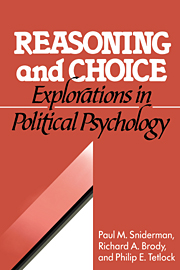Book contents
- Frontmatter
- Contents
- List of tables and figures
- Preface
- 1 Introduction: major themes
- 2 The role of heuristics in political reasoning: a theory sketch
- 3 Values under pressure: AIDS and civil liberties
- 4 The principle–policy puzzle: the paradox of American racial attitudes
- 5 Reasoning chains
- 6 The likability heuristic
- 7 Democratic values and mass publics
- 8 Ideological reasoning
- 9 Information and electoral choice
- 10 Stability and change in party identification: presidential to off-years
- 11 The American dilemma: the role of law as a persuasive symbol
- 12 Ideology and issue persuasibility: dynamics of racial policy attitudes
- 13 The new racism and the American ethos
- 14 Retrospect and prospect
- Notes
- Bibliography
- Subject index
- Author index
7 - Democratic values and mass publics
Published online by Cambridge University Press: 05 May 2010
- Frontmatter
- Contents
- List of tables and figures
- Preface
- 1 Introduction: major themes
- 2 The role of heuristics in political reasoning: a theory sketch
- 3 Values under pressure: AIDS and civil liberties
- 4 The principle–policy puzzle: the paradox of American racial attitudes
- 5 Reasoning chains
- 6 The likability heuristic
- 7 Democratic values and mass publics
- 8 Ideological reasoning
- 9 Information and electoral choice
- 10 Stability and change in party identification: presidential to off-years
- 11 The American dilemma: the role of law as a persuasive symbol
- 12 Ideology and issue persuasibility: dynamics of racial policy attitudes
- 13 The new racism and the American ethos
- 14 Retrospect and prospect
- Notes
- Bibliography
- Subject index
- Author index
Summary
Easily the most imaginative rethinking of political tolerance since Stouffer's seminal study has been offered by Sullivan, Piereson, and Marcus – imaginative, but possibly misleading.
Employed as a supplement, their analysis can be a valuable corrective, particularly in underlining that even people broadly disposed to tolerate others can find a particular group unacceptable to them. But Sullivan and his colleagues have adopted a more ambitious stance, taking the position that their conceptualization and analysis of political tolerance should replace the alternatives.
The fundamental premise of their approach is that political tolerance is sui generis. So they insist that, to be politically tolerant, a person must be willing to put up with a group they dislike, this being a root conception in the origin of political toleration of religious heterogeneity. For our part, a twentieth-century conception of tolerance has advantages over a seventeenth-century one: It is unreasonable, simply put, to insist that for a person to be racially tolerant, he or she must dislike blacks.
From our perspective, if the task is to understand how far ordinary people can undertake a commitment to a cornerstone value like tolerance, it is crucial to appreciate the nexus among forms of tolerance: political, racial, religious, and social. So in this chapter we supply a demonstration of how forms of tolerance that appear in their manifest content to be about quite different things – an acceptance of the political rights of controversial groups in one case and an acceptance of blacks in the other – share a common core because they share common causes. […]
- Type
- Chapter
- Information
- Reasoning and ChoiceExplorations in Political Psychology, pp. 120 - 139Publisher: Cambridge University PressPrint publication year: 1991



